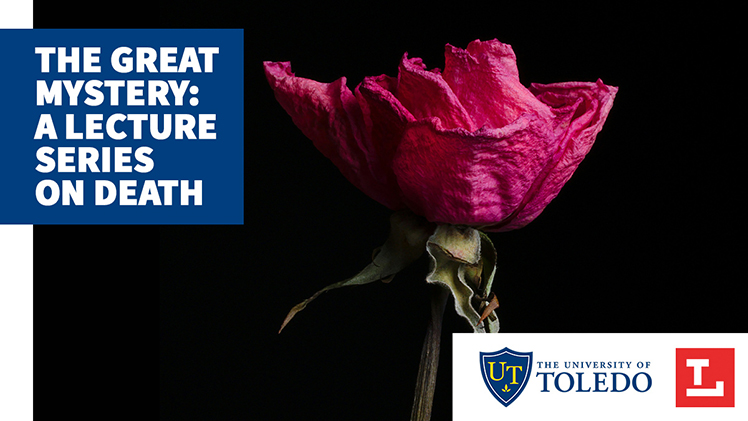University of Toledo scholars in philosophy, neurology, neuroscience and religious studies will explore the concept of death and dying through an ongoing lecture series being hosted by the Toledo Lucas County Public Library.
“The Great Mystery — A Lecture Series on Death,” kicked off this week and runs on select Tuesdays through April 9.
 The next presentation — “Cultures of Death and Near-Death Experiences” — is scheduled for 5:30 p.m. on Tuesday, Feb. 27. All lectures will be held in the library’s Community Room 1.
The next presentation — “Cultures of Death and Near-Death Experiences” — is scheduled for 5:30 p.m. on Tuesday, Feb. 27. All lectures will be held in the library’s Community Room 1.
Registration is not required, and the events are free and open to the public. Each talk will be 20 minutes in length with the rest of the time allotted for community discussion.
Dr. Rayan Magsi, a neurology resident at the UToledo College of Medicine and Life Sciences and one of the organizers of the lecture series, said there’s value in bringing together various academic disciplines for a conversation on what is a universal but little-talked-about human experience.
“To really define and understand death, you have to look at different perspectives,” Magsi said. “There are differences in how medicine sees death, how philosophy or religions see death, how the public views death and dying. We hope to explore the differences and similarities through discussions on a topic that is in some ways a social taboo. This gives us an avenue to have these discussions.”
The kick-off event featured a discussion on science and the science fiction behind the quest for immortality. Upcoming events will explore religious and spiritual beliefs around death, the medical definition of brain death and end-of-life decisions.
Magsi said he hopes that the series fosters a deeper understanding of death’s impact on individuals, families and society.
“It’s interesting to delve into not just the neuroscience of death, but what makes a human being a human being,” he said. “Only by defining what a human being is can we understand death.
“There are so many different ways of viewing what death and by proxy what a meaningful life is, and everyone has to reconcile some of these together to inform their own perspective as well as future decision-making process for themselves and their family,” Magsi added. “Hopefully this will be a great learning experience for everyone involved.”
At the Feb. 27 event, Dr. Ammon Allred, an associate professor of philosophy at UToledo, will be joined by Toledo artist Joni Johnson for a discussion of cultural expressions of death through art and how artistic expressions of death and near-death experiences help people come to terms with their own mortality.
Additional lectures continue through April 9. All lectures begin at 5:30 p.m.
• Tuesday, March 19. “Death Dying and Religion,” featuring Dr. Jeanine Diller, associate professor in the Department of Philosophy and Religious Studies, and Dr. Peter Feldmeier, the Murray/Bacik Professor of Catholic Studies.
• Tuesday, March 26. “What Makes a Person? Life, Death and the Brain,” featuring Dr. John Sarnecki, associate professor of philosophy and chair of the Department of Philosophy and Religious Studies, and Dr. Robert Smith, professor and chair of the Department of Neurosciences and interim chair of the Department of Psychiatry.
• Tuesday, April 2. “Brain Death and Coma Survival,” featuring Dr. Deepa Malaiyandi, assistant professor of neurology, Theresa Hayes, a retired nurse who spent months in an intensive care unit following a ruptured brain aneurysm, and David Hayes, Theresa Hayes’ husband and caregiver.
• Tuesday, April 9. “End of Life Decisions: Ethics and Legalities,” featuring Dr. Rayan Magsi, a neurology resident at UToledo, and Dr. Ally Day, an associate professor of disability studies.